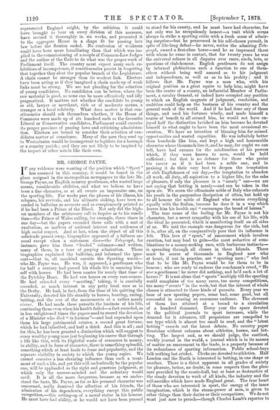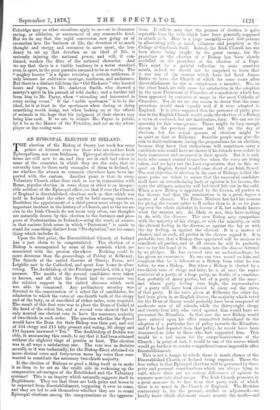MR. GEORGE PAYNE.
I F any evidence were wanting of the position which " Sport " has assumed in this country, it would be found in the place assigned in the metropolitan newspapers to the late Mr. George Payne, an English country gentleman, who wasted large means, considerable abilities, and what we believe to have been a fine character, or at all events an impressive one, on the sporting life. For weeks past the phases of his illness, his relapses, his revivals, and his ultimate sinking, have been re- corded in bulletins as accurate and as conspicuously printed as if he had been a Prince of the Blood. Not only did the high- est members of the aristocracy call to inquire as to his condi- tion—the Prince of Wales calling, for example, three times in one day—but the papers recorded these calls with a sort of exultation, as matters of national interest and evidences of high social respect. And at last, when the object of all this solicitude passed away, biographies appeared of a fullness un- usual except when a statesman dies—the Telegraph, for instance, gave him three " leaded " columns—and written, many of them, in a tone of gasping admiration. Those biographies explained the bulletins, and informed the igno- rant—that is, all mankind, outside the Sporting world— who Mr. Payne was. He was, it appeared, a gentleman who for half a century had passed his whole life in amusing him- self with horses. He had been master for nearly that time of the Pytchley Hunt. He had run horses on every race-course. He had attended every "meeting," taking, it is carefully recorded, as much interest in any petty local race as in the Derby. He had, in fact, from the time of his quitting the University, devoted his life steadily to horses, hunting, racing, betting, and the rest of the amusements of a rather manly vireur. He had made these pursuits the business of his life, continuing them even when his health failed—a fact recorded, as in less enlightened times the papers used to record the devotion of a Minister who died "in harness"—and had expended upon them his large patrimonial estates, a second great fortune, which he had inherited, and half a third. And this is all ; and for this, he has been granted a distinction which will suggest to every wealthy young man just beginning his career that through a life like this, with its frightful waste of resources in money, in ability, and in force of character, there is something splendid, something which at least leads to fame and popularity, and the separate visibility in society to which the young aspire. We cannot conceive a less elevating influence than such a treat- ment of such a life, and yet this will undoubtedly be the popular one, will be applauded as the right and generous judgment, at which only the narrow-minded and the sedentary would cavil. It is all the more dangerous, because as we under- stand the facts, Mr. Payne, as far as his personal character was concerned, really deserved the affection of his friends, the admiration of his dependents, everything except this public recogration,—this setting-up of a moral statue in his honour. He must have had ability, or he would not have been pressed ; to stand for his county, and he must have had character, for I not only was he scrupulously honest—a trait which seems always to strike a sporting critic with a fresh sense of admir- ing surprise—but he persevered in his self-chosen pursuit, in spite of life-long defeat—he never, writes the admiring Tele- graph, owned a first-class horse—and he so impressed those with whom he came in contact, that for twenty years he was the universal referee in all disputes over races, cards, bets, or questions of club-honour. English gentlemen do not assign by informal plebiscitum such a function to one of them- selves without being well assured as to his judgment and independence, as well as as to his probity ; and it follows that Mr. Payne was a man who, with his original position as a great squire to help him, might have been the centre of a county, an influential Member of Parlia- ment, a cavalry General, or indeed have occupied any position in which an English magnate of judgment, resolution, and ambition could help on the business of his country and the general work of the world. And if he had done any of these things, and used his fortunes wisely, and made himself a source of benefit to all around him, he would not have en- joyed half the distinction lavished on him because he devoted himself to what ought to have been the most occasional re- creation. We have no intention of blaming him for missed opportunities and wasted capacities. He was infinitely better than hundreds like him, and kept a high and honourable character where thousands lose it, and he may, for aught we can tell, have had excuses for the misdirection of his powers which, if they were known to men, would be held sufficient ; but that is no defence for those who praise his career as if it had been a noble one, and in praising it do their very best to deepen the temptation of rich Englishmen of our day,—the temptation to abandon all work, all duty, all aspiration to a higher life, for the sake of pleasure, if only the pleasure is a " manly " one—we are not saying that betting is manly—and can be taken in the open air. We scorn the effeminate noble of Italy who exhausts his youth in the purposeless dissipation of cities, but hold up to all honour the noble of England who wastes everything equally with the Italian, because he does it in a way which leaves him his health and "encourages the breed of horses."
The true cause of the feeling for Mr. Payne is not his character, but a secret sympathy with his use of his life, with the ideal he presented, which is manifesting itself on all sides of us. We said the example was dangerous for the rich, but it is, after all, on the comparatively poor that its influence is felt. This love of "sport," of amusement which involves exertion, but may lead to gain—the most seductive of com- binations to a money-seeking race, with barbarous instincts— is spreading through all classes in these Islands. There must be scores of thousands in England now who at heart, if not in practice, are "sporting men ; " who feel that to be like Mr. Payne would be for them to be in heaven ; who are ready to endorse the coachman's creed," He WOr a gentleman ! he never did nothing, and he'd such a lot of horses !" It is not alone that " sports" multiply till the sporting world complains of too many races, too many competitions, too many" events" in the week, but that the interest of whole classes is attracted to these kinds of pursuits. Every year we hear of new sporting papers, some bad, some good, but all successful in securing an enormous audience. The cleverest of them has attained at a bound to a circulation of a hundred thousand. Every year the space devoted in the political journals to sport increases, while the demand for it advances, till proprietors are compelled to use type which is almost too small to read, and the "latest betting" crowds out the latest debate. No country paper flourishes without columns about athletics, horses, and bet- ting. The largest and, as we should judge, the costliest, weekly journal in the world, a journal which is in its masses of matter an amazement to the trade, is a property because of its redundance of sporting information. Public school-boys talk nothing but cricket. Clerks are devoted to athletics. Half London and the North is interested in betting, in one shape or another. There is a thirst apparent in all grades of society for pleasure, better, no doubt, in some respects than the plea- sure provided by the music-hall, but at least as destructive of the steady devotion to work of all kinds, the industry and the self-sacrifice which have made England great. The true heart of those who are interested in sport, the energy of the inner imagination, which is the steam-power of men, is given to other things than their duties or their occupations. We do not want just now to preach—though Charles Lamb's repartee to
Coleridge may on other occasions apply to us—or to denounce racing, or athletics, or amusement of any reasonable kind. But we do say that the rapid conversion now going on of recreation into the business of life, the devotion of so much thought and energy and resources to mere sport, the ten- dency to set up that devotion as an ideal of life, is seriously injuring the national power, and will, if con- tinued, weaken the fibre of the national character. And we say that there is a visible tendency to a worse standard even in sport, in the poor pursuits assumed to be so worthy. The "mighty hunter" is a figure retaining a certain nobleness, if only because he cultivates courage, readiness, and endurance. But there is a distinct fall from the" Old Shekarry "who hunted boars and tigers, to Mr. Assheton Smith, who showed a martyr's spirit in his pursuit of wild ducks ; and a further fall from him to Mr. Payne, when "attending and interested in every racing event." If the "noble sportsman" is to be the ideal, let it at least be the sportsman when daring or doing something worth doing, not when looking on at the efforts of animals in the hope that his judgment of their sinews may bring him cash. If we are to admire Mr. Payne in public, let it be as the Master of the Pytchley, and not as the whist- player or the racing man.































 Previous page
Previous page